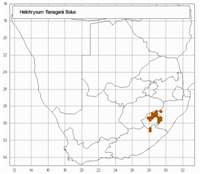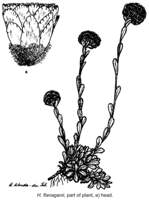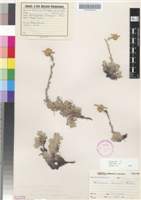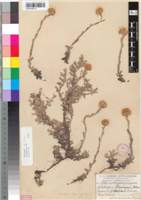Common names:
Phefo (SS)
Origin of name:
flanaganii = after HG Flanagan (1861-1919) of Komga, Eastern Cape
Diagnostic characters:
Mat-forming with numerous short flowering stemsGolden-yellow bractsMedium-sized headsCompact round inflorescences
Description:
Profusely branched mat-forming perennial herb, main branches prostrate, rooting, soon nude, ultimate branchlets elongating at flowering, ascending, c. 40-200 mm long, greyish-white woolly, closely leafy. Leaves mostly basal, up to 8 (-20) x 4 mm, obovate or oblong-obovate, narrowed to the base and half-clasping, apex obtuse, apiculate, both surfaces glandular-punctate and closely greyish-white woolly, or rarely without wool and with stalked glands. Heads heterogamous, sub-cylindric, c. 3 x 3 mm, many felted together at the base in a congested, rounded, terminal corymbose cluster up to 18 mm across. Involucral bracts in c. 4 series, graded, imbricate, inner about equaling flowers, not radiating, tawny-yellow, tipped golden-brown. Receptacle smooth or shortly honeycombed. Flowers c. 35-55, 8-15 female, 22-40 homogamous, yellow. Achenes 0.75 mm, glabrous. Pappus bristles many, delicate, tips barbellate, bases cohering lightly by patent cilia.
Flowers from October to December.
Distribution:
Forms thick mats over damp rock sheets, on bare earth or in short damp turf, between c. 1 650 and 3 200 m. On the high mountains of Lesotho and along the Drakensberg from Mont aux Sources (Bergville district, KwaZulu-Natal) to Naude's Neck, north of Maclear in the Eastern Cape.
Grassland Biome.
Notes:
The typical form has grey-woolly leaves, but green-leaved plants are not uncommon, and the two may grow together.
Taxonomy:
Literature:
Helichrysum flanaganii H. Bol. in Trans. S. Afr. phil. Soc. 18: 385 (1907); Hilliard, Compositae in Natal 163 (1977).
Type:
Lectotype: Free State, summit Mont aux Sources, Flanagan 1964 (BOL; K, isolecto.)
Synonym(s):
Vouchers:
Hilliard 5391 (E; K; MO; NU; PRE; S); Hilliard & Burtt 7085 (E; K; MO; NU; S); Ruch 2435 (PRE); Wright 329 (E; K; NU; S).


_sml.jpg)
_sml.jpg)
_sml.jpg)

